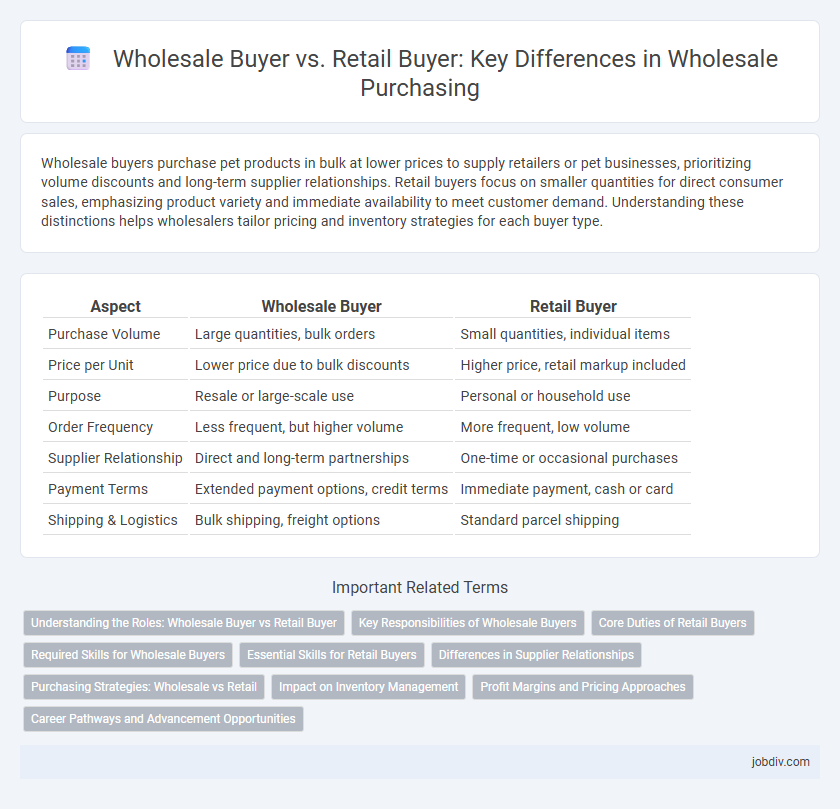Wholesale buyers purchase pet products in bulk at lower prices to supply retailers or pet businesses, prioritizing volume discounts and long-term supplier relationships. Retail buyers focus on smaller quantities for direct consumer sales, emphasizing product variety and immediate availability to meet customer demand. Understanding these distinctions helps wholesalers tailor pricing and inventory strategies for each buyer type.
Table of Comparison
| Aspect | Wholesale Buyer | Retail Buyer |
|---|---|---|
| Purchase Volume | Large quantities, bulk orders | Small quantities, individual items |
| Price per Unit | Lower price due to bulk discounts | Higher price, retail markup included |
| Purpose | Resale or large-scale use | Personal or household use |
| Order Frequency | Less frequent, but higher volume | More frequent, low volume |
| Supplier Relationship | Direct and long-term partnerships | One-time or occasional purchases |
| Payment Terms | Extended payment options, credit terms | Immediate payment, cash or card |
| Shipping & Logistics | Bulk shipping, freight options | Standard parcel shipping |
Understanding the Roles: Wholesale Buyer vs Retail Buyer
Wholesale buyers purchase large quantities of products directly from manufacturers or distributors, aiming to secure lower unit prices for resale to retailers or businesses. Retail buyers focus on selecting products that appeal to end consumers, managing inventory for physical stores or online platforms. Understanding these roles helps businesses optimize supply chain strategies and pricing models to meet market demands efficiently.
Key Responsibilities of Wholesale Buyers
Wholesale buyers negotiate bulk purchasing agreements, ensuring optimal pricing and inventory levels to meet large-scale demand. They analyze market trends and supplier capabilities to secure consistent product quality and reliable delivery schedules. Managing vendor relationships and coordinating logistics are critical to maintaining the supply chain efficiency in wholesale operations.
Core Duties of Retail Buyers
Retail buyers primarily focus on selecting and purchasing products that meet consumer demand while optimizing inventory turnover and maintaining profitability. They analyze market trends, customer preferences, and seasonal factors to choose merchandise that aligns with the store's brand and target audience. Retail buyers also negotiate with suppliers, manage purchase orders, and collaborate with marketing and sales teams to ensure product availability and promotional success.
Required Skills for Wholesale Buyers
Wholesale buyers require strong negotiation abilities, in-depth market analysis skills, and expertise in supply chain management to secure bulk products at competitive prices. Proficiency in forecasting demand and understanding supplier relationships enables them to optimize inventory levels and reduce costs. Analytical thinking and excellent communication skills are essential for managing large-scale purchases and coordinating with vendors efficiently.
Essential Skills for Retail Buyers
Retail buyers excel in market analysis, consumer behavior understanding, and trend forecasting to make informed purchasing decisions. Strong negotiation skills and supplier relationship management are essential for securing competitive pricing and quality products. Proficiency in inventory control and sales data interpretation supports efficient stock management and maximizes profit margins.
Differences in Supplier Relationships
Wholesale buyers maintain direct, large-scale relationships with suppliers, negotiating bulk pricing and favorable contract terms to secure inventory at lower costs. Retail buyers often rely on wholesalers or distributors as intermediaries, purchasing smaller quantities for immediate consumer resale rather than direct manufacturer engagement. These differences impact each buyer's supply chain control, negotiation leverage, and pricing strategies.
Purchasing Strategies: Wholesale vs Retail
Wholesale buyers prioritize bulk purchasing to maximize cost savings and negotiate volume discounts, leveraging long-term supplier relationships for consistent supply chains. Retail buyers focus on smaller, frequent orders aligned with consumer demand trends, emphasizing inventory turnover and seasonal assortment adjustments. Both buyers employ distinct forecasting models; wholesale relies on market demand projections while retail uses detailed point-of-sale data for agile stock management.
Impact on Inventory Management
Wholesale buyers typically purchase large quantities of products at lower prices, enabling businesses to maintain higher inventory levels and benefit from bulk discounts, which improves cost efficiency and stock availability. Retail buyers focus on smaller, frequent orders tailored to customer demand, requiring precise inventory management to avoid overstocking or stockouts and ensuring timely replenishment. Effective inventory management strategies differ significantly between wholesale and retail buyers due to variations in order volume, frequency, and sales cycles.
Profit Margins and Pricing Approaches
Wholesale buyers benefit from lower unit costs by purchasing in bulk, enabling higher profit margins when products are sold to retail buyers. Retail buyers face higher per-unit prices but target end consumers with marked-up prices to cover expenses and generate profit. Pricing approaches in wholesale emphasize volume discounts and cost efficiency, while retail pricing focuses on competitive markups and consumer demand dynamics.
Career Pathways and Advancement Opportunities
Wholesale buyers often advance by developing expertise in supply chain management and vendor relations, leading to roles like purchasing manager or procurement director. Retail buyers gain career growth through strong market trend analysis and customer preference insights, progressing toward merchandising manager or retail buyer director positions. Both pathways require strategic sourcing skills and offer opportunities in leadership within their respective sectors.
Wholesale Buyer vs Retail Buyer Infographic

 jobdiv.com
jobdiv.com